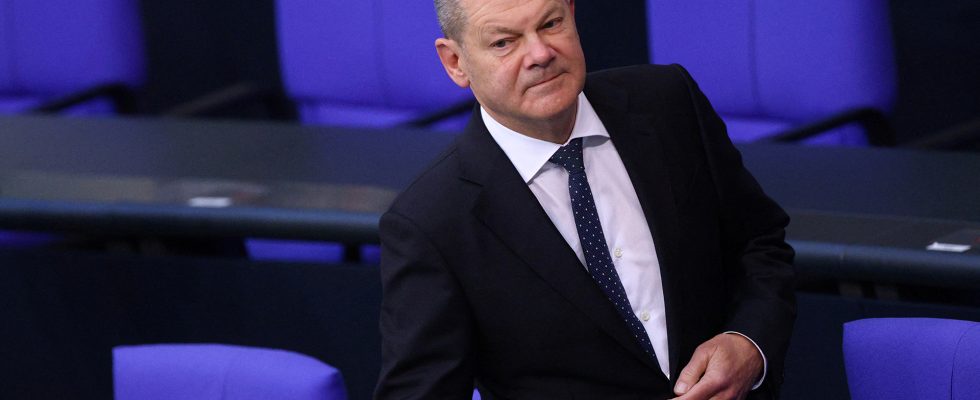FAQ
Status: 4/4/2023 3:58 p.m
Chancellor Scholz has been following the cum-ex deals of the Hamburg Warburg Bank for a long time. The Union is now calling for a committee of inquiry to investigate the tax scandal. What is it about? Answers to some questions.
the initial situation
The Union wants to target today’s Chancellor Olaf Scholz (SPD) in a committee of inquiry of the Bundestag for the political processing of the tax scandal of the Hamburg Warburg Bank. There are many contradictions and inconsistencies regarding his role as Hamburg’s former first mayor, which even a parliamentary committee of inquiry of the Hamburg Parliament has not yet been able to clear up, said Matthias Hauer, chairman of the CDU/CSU parliamentary group in the finance committee.
Since the traffic light coalition has repeatedly prevented Scholz from being summoned to the finance committee, an investigative committee of the Bundestag is inevitable.
What is the tax affair about?
The Hamburg private bank MM Warburg was involved in the illegal cum-ex business and earned millions. For a long time, the processing has mainly revolved around the question of repayment: Actually, the Warburg-Bank would have had to repay a total of 47 million euros for cum-ex transactions from 2009 alone. In December 2016, however, the Hamburg tax authorities decided not to raise the originally planned reclaim due to wrongly reimbursed capital gains tax and to let it run into the statute of limitations for the time being.
A second claim for a further 43 million euros was raised at the end of 2017 shortly before the statute of limitations on the instructions of the Federal Ministry of Finance. According to a court ruling, the bank finally settled all outstanding tax reclaims in 2020, but is still trying to get the money back through legal channels.
What are cum-ex trades?
Cum-ex trades are so-called because large batches of stocks with (“cum”) and no (“ex”) dividend entitlements were shuffled back and forth in rapid succession around the payout date. The deliberately opaque transactions had only one goal: to create as much confusion as possible for the tax authorities. With this trick, those involved could be reimbursed on a large scale with capital gains tax, which was never paid. The profits were shared. This was made possible by a legal loophole that has since been closed. By then, the cum-ex business had been booming for years.
What does Scholz have to do with the matter?
As Hamburg’s first mayor at the time, Scholz was in contact with Warburg co-owner Christian Olearius in 2016 and 2017. Since this became known, there has been a suspicion that Scholz could have exerted influence in favor of the bank during the period when a repayment was at stake.
In his two previous interrogations before an investigative committee of the Hamburg Parliament, Scholz admitted that the meetings took place, but referred to gaps in memory with regard to the content of the discussions. He always rejected the suspicion of political influence. In two and a half years of activity, the Hamburg investigative committee has not yet provided any evidence of influence.
What should the investigative committee bring?
The Union sees many open questions in the political processing of the tax scandal. On the one hand, the committee should now clarify the question of a possible influence, on the other hand, it should be checked whether the memory gaps mentioned are credible.
The surveys conducted by Scholz during his time as Federal Minister of Finance in the Finance Committee of the Bundestag in 2020 should also play an important role. Critics see parts of his statements in connection with Cum-Ex and Warburg, which have now been published in the form of minutes, as evidence that Scholz admitted personal memories of his meetings with Olearius at the time and thus lied to the Hamburg investigative committee when he later asserted otherwise.
The Hamburg Attorney General recently came to the conclusion that there was no initial suspicion against Scholz for making false statements with regard to his statements in the various parliamentary committees.
When does the committee start?
In the first week of meetings after Easter, the CDU/CSU parliamentary group wants to apply for the committee to be set up, as deputy parliamentary group leader Mathias Middelberg announced. The opposition faction can do this on its own, because the Bundestag has to set up a committee of inquiry at the request of at least a quarter of its MPs.
What are the other parties saying?
The Union faction will submit the application alone, said Matthias Hauer, chairman of the CDU/CSU parliamentary faction in the finance committee. Invite the other factions to help clear things up. The left wants to consider support, said their financial policy spokesman Christian Görke.
The SPD, on the other hand, accuses the Union of wanting to set up a committee of inquiry into the tax scandal surrounding the Hamburg Warburg Bank for “party tactical interests”. “The issue has been fully dealt with in parliament and society and is transparent,” said Katja Mast, the parliamentary director of the SPD parliamentary group in the Bundestag, the dpa news agency. The Union brings forward claims that have long since been refuted.
The Green politician Bruno Hönel said that ARD Capital Studio: “Of course, all parliamentary instruments are available to the Union if it wants to deal with issues.”

